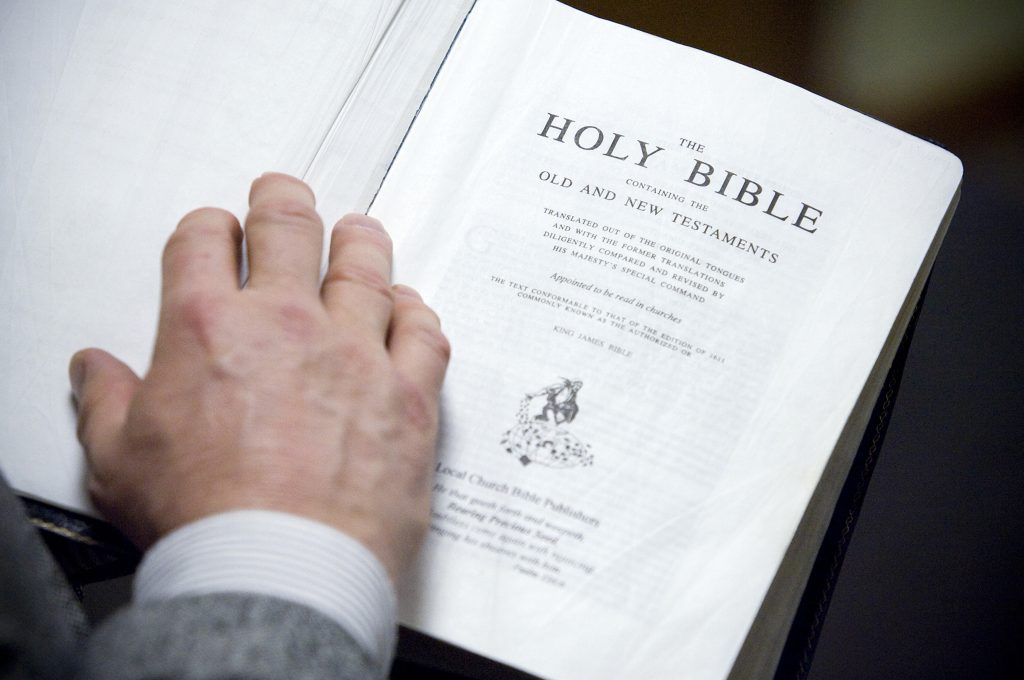Last week, 12 Republican representatives in the Iowa Statehouse introduced a bill that would allow public high schools to offer a class on Bible literacy as a social-studies elective.
The move has raised eyebrows among religion professors and leaders in the Iowa City area, who fear the bill is not inclusive and may pave the way for biased teaching. Iowa would join eight other states that have introduced or passed similar bills.
The class would focus on “knowledge of biblical content, characters, poetry, and narratives that are prerequisites to understanding contemporary society and culture” of the Hebrew Scriptures, the New Testament, or both, the bill reads. Students would be able to choose the version of the Bible to use.
“The Bible has been a fundamental element for our society, culture, and history of our country,” said Rep. Dean Fisher, R-Montour, who introduced the legislation last week.
Iowa City West High offers a similar English credit course. The class, Bible Literature, studies the Hebrew and Protestant Bibles from a “literary and historical, non-religious perspective,” according to the course offerings.
Staci Hupp, the chief of bureau communications and information services of the State Education Department, said the department knew of 68 districts that offered courses that included academic study of the Bible.
“Schools are not prevented from teaching a class that looks at the literature or art or culture of the Bible,” Hupp said.
RELATED: UI expels Christian student club over leadership requirement
Under current Iowa law, schools can’t exclude religious texts from the classroom, but institutions also can’t make it a requirement for students.
“You can already [teach these classes],” UI biblical-studies Lecturer Jordan Smith said, “That’s what causes alarm bells for me.”
The bill would direct the State Board of Education to add course standards for biblical studies classes and explicitly allow public schools to offer such courses.
Schools wouldn’t be required to offer a class — the district’s school board must first approve it.
Fisher said he was not aware of any classes similar to those proposed in the bill being taught in Iowa.
On Tuesday, the bill was referred to an education subcommittee for examination; that panel will meet sometime next week, Rep. Skyler Wheeler, R-Orange City, wrote in an email to The Daily Iowan. A date for debate has not been set.
Other states that have approved similar bills include Arizona, Arkansas, Georgia, Oklahoma, Tennessee, and Texas. On Jan. 11, legislation introduced to the West Virginia Legislature would require all schools to offer a Bible-literacy elective.
Kentucky has come under fire from the ACLU since passing a similar bill last year, claiming several curricula have used the class to impart religious messages.
Sam Massey, the pastor of the First Presbyterian Church, 2701 Rochester Ave., said he had concerns about enforcing objectivity.
“Once you let the nose of the camel in the tent, pretty soon you’ve got the whole camel,” Massey said.
Robert Cargill, a UI assistant professor of Judaism and Christianity, is collaborating with professors from other state universities to write an op-ed in response to the introduction of the legislation.
He said even at the college level, it’s difficult to teach all parts of the Bible objectively, including the “good, the bad, and the ugly.”
“I, too, want every student to have an education of the Bible, but the fear is that [if] we let just anyone teach the Bible, that teacher will inject personal beliefs they may have,” he said.
Pastor Roger Dykstra of Gloria Dei Lutheran Church, 123 E. Market St., wrote in an email to The Daily Iowan that although he thought there should be more education on the Bible, he also thought churches should take up the mantel on education because he was wary of the bill excluding other religious texts.
“I believe [more biblical instruction] is more a call to the church to do a better job of doing its job rather than asking the state to do its job for it,” he said.



